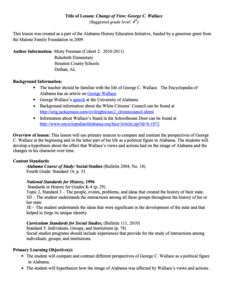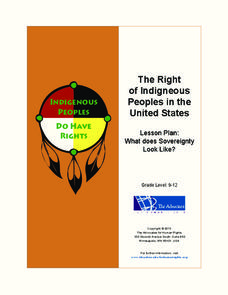Stanford University
Expansion of the Inca Empire
If you could write your own history textbook, what would you include? Learners play the role of textbook writers by examining evidence of the Inca Empire. With primary sources from Spanish and indigenous perspectives, as well as images,...
Curated OER
African Americans after the Civil War
Students explore the events of Reconstruction after the Civil War. In this US History lesson, students complete several activities and worksheets that reinforce challenges and social upheaval experienced in the South after the Civil War.
Curated OER
Before Brother Fought Brother: People and Places in the North and South
Students use census records to research and compare the population and economies in two counties within the same valley (Franklin Country Pennsylvania (North) and Augusta County, Virginia (South) in the pre Civil War era.
Curated OER
North and South - Impact of the Abolitionist Movement
Learners examine history of slavery in United States, discuss abolitionists such as Frederick Douglass who worked to end slavery, listen to excerpts from Douglass' autobiography, and visit interactive Underground Railroad web site.
Crafting Freedom
Frances Ellen Watkins Harper: Lover of Literacy
This, the sixth in a series of 10 related resources, examines the life and works of Frances Ellen Watkins Harper, an African American author, born in 1825, who advocated literacy for both free and enslaved African Americans.
Curated OER
Social Effects of WWII on SC (Pt. 3)
Fifth graders examine the impact of World War II on South Carolina. In this American history instructional activity, 5th graders analyze primary documents that include political cartoons and advertisements that were published in South...
Curated OER
Who is Robert M. Glass? - Black History Month
Pupils research the role of African Americans during the each of the United States' wars. In this African American history lesson, students research information and statistics about the role of African Americans in the following wars:...
Curated OER
Slave Narratives: Constructing U.S. History Through Analyzing Primary Sources
Learners access oral histories that contain slave narratives from the Library of Congress. They describe the lives of former slaves, sample varied individual experiences and make generalizations about their research in journal entries.
Curated OER
Metal Tooling with Colored Pencils
Take your art class back centuries to the art of metal tooling. This is an art technique also referred to as embossing, or repajado in Mexico and South America. This is a fun project to introduce a new technique and new materials. This...
Digital Public Library of America
Teaching Guide: Exploring To Kill a Mockingbird
Harper Lee's To Kill a Mockingbird, considered by many to be a seminal piece of American literature, contains many complex literary themes that carry through United States history. Use a series of discussion questions and classroom...
Curated OER
Melba Pattillo and Ruby Bridges: Two Heroes of School Integration
Learners put themselves in the shoes of students who integrated Little Rock High School in 1957-58. Note: The primary resources in this activity provide powerful and poignant descriptions of what those students faced.
Curated OER
Booker T. Washington and W. E. B. DuBois: The Problem of Negro Leadership
Students focus on the problem of African American leadership throughout American history. In groups, they research the life and works of Booker T. Washington and W.E.B. DuBois and how they worked to promote the need for African American...
Curated OER
Ancient Gold Working
Learners create a sculpture inspired by the masks, pendants, or human and animal forms found in ancient Indian art of the Americas. They focus on the techniques of metalworking, especially repousse.
Curated OER
History and Human Rights: A Process for Analyzing Events
Students analyze various American History topics which concern human rights. They research the topics and analyze the sources for bias or stereotype. They decide and discuss whether or not any human right were violated in each...
Roy Rosenzweig Center for History and New Media
Reconstruction
When slavery ended, what did the government do to help African American during Reconstruction? An interesting instructional activity uses primary sources such as newspaper articles to help scholars analyze Reconstruction policies and how...
Defining US
Integration of Education and American Society
How did the struggle for Civil Rights during the 1950s transform American society and politics? Why are American schools integrated today? Class members explore these essential questions by examining a series of primary and secondary...
Crafting Freedom
F.E.W. Harper: Uplifted from the Shadows
Young historians discover the life of an incredible African American woman who, as an anti-slavery lecturer prior to the Civil War, defied stereotypes of what women could accomplish. Pupils explore the concept of stereotyping, read...
PBS
Breaking the Code: Actions and Songs of Protest
Ezell Blair, Jr., David Richmond, Franklin McCain and Joseph McNeil changed history. Their sit-in at the lunch counter of the Woolworths in Greensboro, North Carolina on February 1, 1960 became a model for the nonviolent protests that...
National Endowment for the Humanities
Frances Ellen Watkins Harper’s “Learning to Read”
Frances Ellen Watkins Harper's poem "Learning to Read" is the focus of a lesson that teaches middle schoolers how to do a close reading of a text. The lesson introduces them to a brief biography of the poet, includes a video reading, and...
Alabama Department of Archives and History
Birmingham: The Magic City
Why is Birmingham known as the magic city? A comprehensive lesson plan provides hands-on activities, group discussion, and writing exercises to teach young historians about the importance of the city of Birmingham. Scholars learn the...
Alabama Department of Archives and History
Change of View: George C. Wallace
Who exactly was George C. Wallace? A great lesson plan provides young historians with a hands-on activity, direct instruction, and discussion to learn about Wallace, why he was an important figure, and why he changed his mind about...
Advocates for Human Rights
The Right of Indigneous Peoples in the United States
The sovereignty of U.S. Native American nations is the focus of a resource that asks class members to compare the Right to Self-Determination in the UN Declaration on the Rights of Indigenous Peoples with a fact sheet that details the...
Curated OER
South American Architecture
Seventh graders review and discuss what they read about North American architecture. They then study images of North and south American architecture and make comparisons
Curated OER
African Americans Seen Through the Eyes of the Newsreel Cameraman
Fifth graders become familiar with the role of African Americans during WWII. For this WWII lesson, 5th graders watch a newsreel and discuss its use as a primary source. Students answer questions about the newsreel.

























